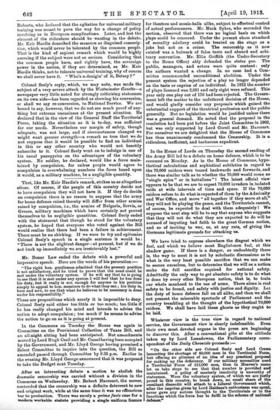After an interesting debate a motion to abolish the dramatic
censorship was carried without a division in the Commons on Wednesday. Mr. Robert Harcourt, the mover, contended that the censorship was a definite deterrent to new and original work, while at the same time it was no efficacious bar to production. There was surely a prima facie case for a modern -workable statute providing a single uniform licence for theatres and music-halls alike, subject to effectual control of actual performances. Mr. Mark Sykes, who seconded the motion, observed that there was no logical basis on which plays could be censored. Under the present sham standard of morality adultery could be treated on the stage as a joke but not as a crime. The censorship as it now existed was a bulwark of false taste and absurd and arbi- trary convention. Mr. Ellis Griffith (the Under-Secretary to the Home Office) ably defended the status quo. The public, managers, and actors were quite content : only the authors wanted a change. In no case had a Com- mittee recommended unconditional abolition. Under the present system the rejection of a play 110 longer depended on the taste or caprice of an individual. In 1912 the number of plays licensed was 2,081 and only eight were refused. This year only one play out of 176 had been rejected. The Govern- ment left the matter to the unfettered decision of the House, and would gladly consider any proposals which gained the substantial support of the theatrical profession and the public generally. But no legislation would be justified unless there was a general demand. He noted that the proposal in the resolution had been put before the Joint Committee in 1909, but was only supported by Lord Goren and Mr. Harcourt. For ourselves we are delighted that the House of Commons has thus unanimously condemned the Censorship. It is a ridiculous, inefficient and barbarous expedient.










































 Previous page
Previous page